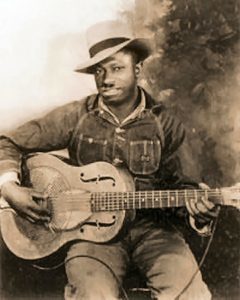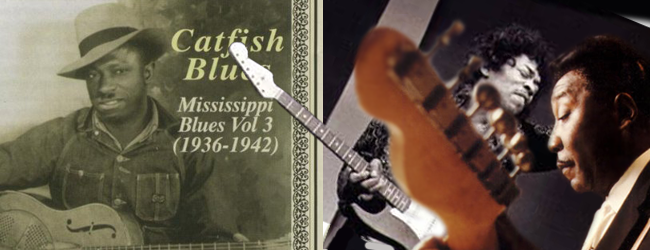
We’re bringing you another entry in American Blues Scene’s exclusive “Brief History of a Song” series.
“Catfish Blues” is a persistent song. It’s been sang countless times, sped up, slowed down, and borrowed from. It’s had lines and verses added and taken away. It’s been called different things; Voodoo Chile, Rollin’ Stone. The “Catfish blues” as it’s most well known, originated “first” by a Mississippi delta bluesman named Robert Petway in 1941, though the most famous line about wishing one was a catfish can be heard on record as early as 1928. That’s to be expected, however; the original delta blues singers freely and frequently borrowed lines from one another. Almost nothing is known about Robert Petway aside from the fact that he recorded sixteen songs in 1941 and ’42. After that, he essentially vanished, and no records of his life, birth, or death have ever been found – though plenty have looked. For a rural black man in Mississippi, unfortunately, this wasn’t necessarily uncommon. His music, however, carried on.
Almost a decade after Petway made the first recording, Muddy Waters sang a famous cover of “Catfish Blues” and called it “Rollin’ Stone”. The song was broadly influential, and a little band from England took the name as their own, calling themselves The Rolling Stones. For the curious, Rolling Stone Magazine did indeed take it’s name from Muddy Waters’ song. Muddy was one of the most popular and widely influential bluesmen to have lived, and his popularity served as a conduit to give the catfish blues it’s broadest audience yet.
Several years later, a young artist by the name of James Marshall Hendrix, better known as “Jimi”, had a serious penchant for blues, hot guitar riffs, and wah pedals. He frequently played a cover of “Catfish Blues” as an homage to Muddy Waters, often injecting various lines Muddy had used in his other recordings, as is true blues tradition. Jimi evolved “Catfish Blues” into “Voodoo Chile”, a slow and menacing blues jam. The next day he recorded it’s more famous sister “Voodoo Child (Slight Return)”, which sped the catfish blues up and spun it into a wild rock number with one of the most celebrated guitar solos of all time. The track was and continues to be deeply influential to music everywhere.
“Catfish Blues” has become an extremely musically significant song. From it’s humble origination by a poor, unknown black man in the still deeply segregated south, to Jimi Hendrix wildly shredding it live on stage at the original Woodstock, the image of which is permanently burned into the American psyche. From YouTube, here are four videos chronicling the progression of Catfish Blues, from Petway’s original to Warren Haynes and Gov’t Mule’s recent hard rock cover.
Robert Petway’s Original – 1941
Muddy Waters’ “Rollin’ Stone”, a derivitive of Catfish Blues – 1950
Jimi Hendrix’s Catfish Blues – 1967
Gov’t Mule’s Catfish Blues – 2001

